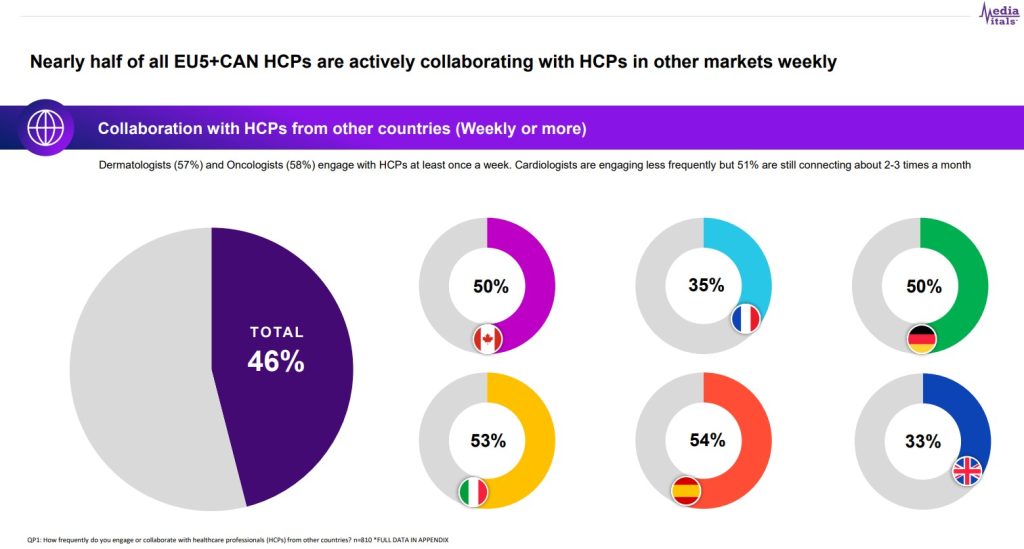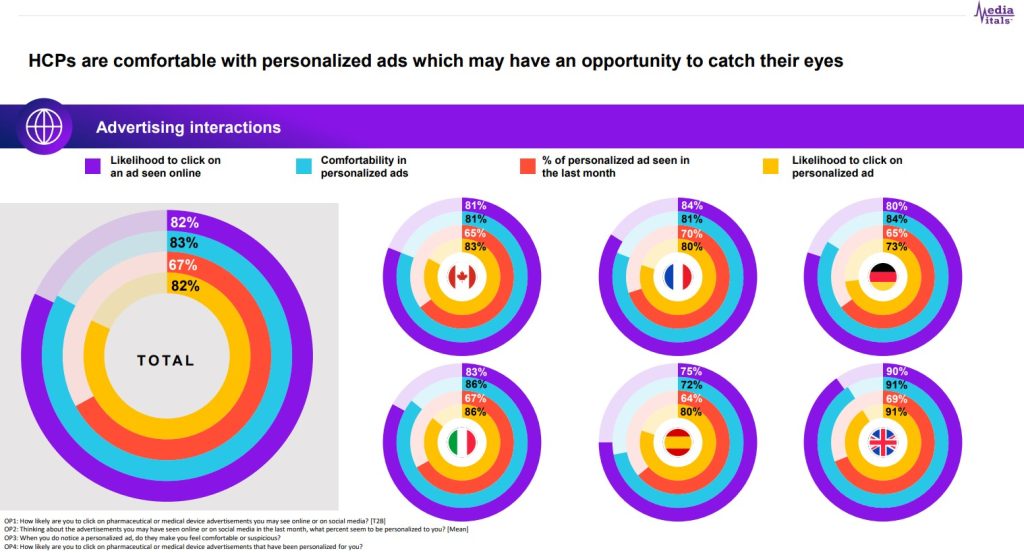- 46% of all HCPs surveyed are actively collaborating with HCPs in other markets weekly.
- 46% of HCPs globally see patients in person, with 16% utilizing televisits.
- 71% of HCPs globally utilize telehealth weekly, led by Spain (87%) and Germany (81%).
- On average, HCPs globally spend 26 minutes talking to patients.
- 41% of HCPs globally are concerned that patients are not sufficiently informed.
- Across all markets, over four fifths are likely to click on an ad seen online (82%), are comfortable with personalized ads (83%) and likely to click on a personalized ad (82%).
Healthcare agency CMI Media Group, a WPP company (NYSE: WPP), has unveiled its first ever Media Vitals HCP Global research. The new report provides insights into the media preferences of healthcare professionals (HCPs) on a global scale.

Insights were gathered from MDDOs including General Practitioners, Cardiologists, Pulmonologists, Hematologists, Neurologists, Oncologists, Obstetricians-Gynecologists and Dermatologists. The survey into the communication habits and usage patterns across a diverse range of HCPs was conducted in France, Germany, Italy, Spain, United Kingdom (UK) and Canada.
International collaboration
Nearly half (46%) of all HCPs surveyed are actively collaborating with HCPs in other markets weekly. Dermatologists (57%) and Oncologists (58%) engage with HCPs at least once a week. Cardiologists are engaging less frequently but 51% are still connecting about 2-3 times a month.
Over half of HCPs in Spain (54%) and Italy (53%) are top collaborators, dropping to a third in France (35%) and the UK (33%) the least collaborative HCPs.
In-person versus televisits
In-person interactions remain the most common form of patient interaction, but HCPs are increasingly looking to other channels. Globally, almost half (46%) of HCPs meet patients in person, 11% via phone calls, 10% by email, 8% by text message, 16% via interactive video platform / televisits and 10% through an electronic patient portal with written communication.
Over half (52%) of interactions with patients in Italy are carried out in-person, with France (20%) and the UK (19%) delivering the highest interactive video platform / televisits. Neurologists are least likely to see patients in-person and most via telehealth, compared to other specialties.
71% of HCPs globally utilize telehealth weekly, led by Spain (87%) and Germany (81%). In Canada (73%) and Italy (78%) high usage is primarily driven by requirements for prescription refills / medication management. Lagging behind, only half (51%) of HCPs in the UK and 55% in France take advantage of telehealth technology.
On average, HCPs globally spend 26 minutes talking to patients. Lasting 29 minutes, German HCPs spend the most amount of time with patients, and British HCPs the least at 22 minutes, which is deemed by 21% of UK respondents as being too much time. In Spain, the 23 minutes spent with patients is also considered by over a third (34%) to be too much time.
Sourcing healthcare information
Two-thirds (59%) of HCPs across all markets are confident that patients have enough information to make informed decisions, leaving 41% concerned that their patients are not sufficiently informed. This demonstrates that media has value in helping HCPs educate patients by providing the key information missing.
The report indicates that an omni-channel approach to media buying is key to reaching HCPs across a wide variety of important information sources.Across all markets, over a third (63%) consider key information sources important, including printed drug references (65%), emails from pharma companies (64%), pharma reps (64%), pharma websites (63%) and print journals (61%). Two fifths (43%) of HCPs globally engage more than three times per week with key sources of information, with office mail (46%) and medical emails (45%) looked at the most often.
In Canada, 72% consider pharma websites the most important source of information, dropping to least important in Spain for a third (65%) of HCPs surveyed. Printed drug references are the top source in France (69%) with social media (57%) least important. In Germany, medical websites rank highest (69%), which is the least useful information source for Canadian HCPs (64%). In Italy, almost three quarters (73%) rate emails from pharma reps, but don’t find online medical videos (63%) useful. Search engines are most valuable to Spanish (71%) HCPs, with British HCPs preferring the personal touch with over a third (65%) ranking conversations with pharma reps as their top information source.

Advertising interactions
HCPs are comfortable with personalized ads which may have an opportunity to catch their eyes. Across all markets, over four fifths are likely to click on an ad seen online (82%), are comfortable with personalized ads (83%) and likely to click on a personalized ad (82%). The UK is the most engaged with advertising, with an average of 91% of British HCPs engaging across all three categories. Offering an opportunity for advertisers, only 67% of HCPs internationally claim to have seen personalized ads in the last month.
“The Media Vitals HCP Global report showcases how brands can optimize and personalize communications with HCPs. It also highlights areas of opportunity and better support needed from pharmaceutical companies. More advanced targeting and messaging tactics are not only welcome, but may provide better engagement and performance,” said Justin Freid, Chief Media & Innovation Officer at CMI Media Group. “An intriguing statistic is that most HCPs believe patients are uninformed, presenting a unique opportunity for better disease education and awareness for patients. Not only do brands need to be utilizing multiple channels, but they also need the data and the pipes connecting their CRM, rep activity and media campaigns to truly deliver an omnichannel experience.”
The full report is available for healthcare marketing clients to request at this link.
Source: CMI Media Group

You must be logged in to post a comment Login